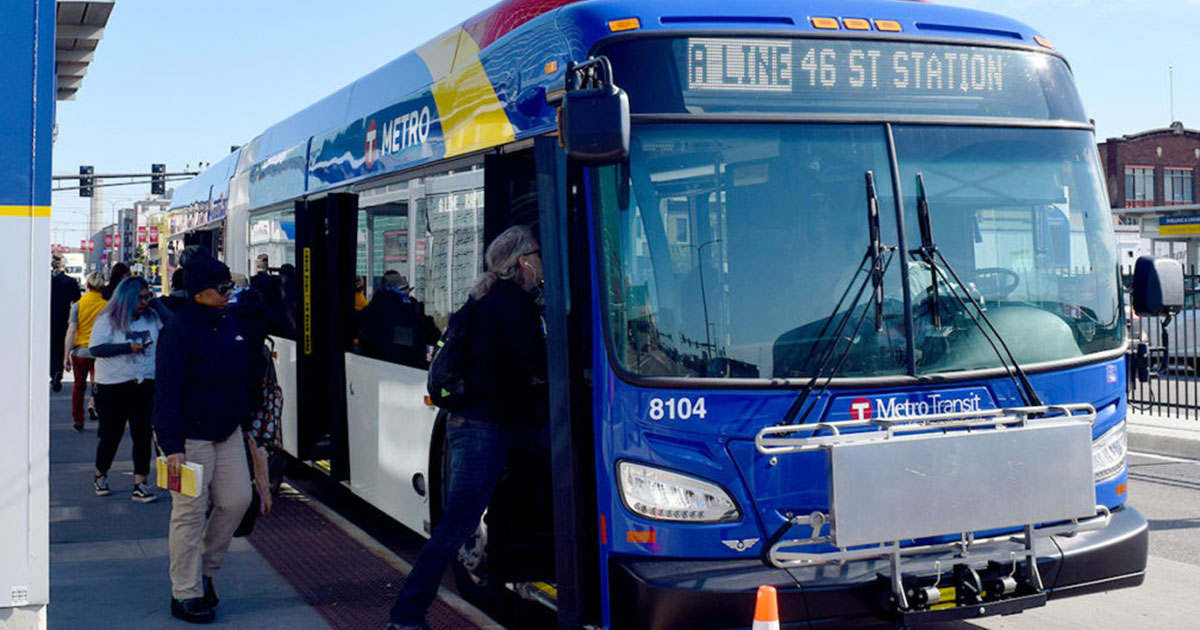Transit Win: The D Line and B Line Are Fully Funded!
Minnesota’s House and Senate have voted to fully fund the METRO D Line and METRO B Line! On October 15, during a fifth special session, state legislators passed the $55 million in bonding needed to complete both essential bus rapid transit (BRT) projects. Construction is expected in 2021 and 2022.
This is fantastic news! And a “historic” funding win for bus rapid transit in the Twin Cities.
These new transit lines are critical for the future of our region: the METRO B Line connects from west of Uptown Minneapolis to Downtown Saint Paul through dense and transit-dependent neighborhoods along Lake Street, Marshall Avenue, and Selby Avenue. The METRO D Line connects people in Bloomington, Richfield, Minneapolis, and Brooklyn Center, predominantly along Chicago Avenue and Fremont Avenue.
The D Line and B Line have been advocacy priorities for Move Minnesota because they have big potential to improve the lives of tens of thousands of people in the Twin Cities every day. These major new routes will bring much-needed transit upgrades to today’s Route 5 and Route 21 corridors, respectively. The 5 and the 21 are Metro Transit’s two busiest regular-route buses, and unfortunately, slow, crowded rides are common. With the funding that passed at the State Capitol today, the new bus rapid transit lines will provide frequent service, comfortable shelters, and fast trips. In fact, building the D and B lines with these dollars will save existing riders nearly 1 million hours each year—all while protecting the air we breathe and the climate we depend on. The legislature’s vote of support effectively gives back that precious time.
Move Minnesota and transit advocates worked hard to secure investments in bus rapid transit throughout 2020. Central to this work, we:
- Led a 35-member coalition to advocate for BRT bonding, biking and walking investments, and statewide transit funding.
- Supported a cohort of allied legislators and legislative champions by connecting 8 legislators with concerned constituents at in-person or phone meetings; directly communicating with 63 legislators, many through multiple conversations; connecting transit advocates to their legislators and to legislative leaders though phone banks and action alerts; and organizing countless strategy sessions.
- Broadened our community’s understanding about the importance of bus rapid transit investments through publication of two studies: one about how transit investments both create and support jobs in Minnesota, and the other about how BRT investments will deliver a more just and dignified trip for current riders by eliminating wasted travel time.
- Articulated how transit service and investments are central to justice and a functioning society during the coronavirus pandemic, how transit investments are investments in community, and how the need for investments in the Chicago Avenue and Lake Street corridor communities were only further accentuated by the uprisings and continued call for racial justice in those neighborhoods.
- Maintained leadership and pressure through multiple special legislative sessions.
Thank you to the transit advocates, allies, and legislative champions who fought beside us to fund these projects and make this progress possible!
We now look forward. We celebrate and we keep the progress coming. Although the METRO B and D lines are funded, the E Line—planned to connect Edina to the U of M along Hennepin and University Avenues in Minneapolis—and the entire BRT network still need more investment. The imperative that our community memorialize the murder of George Floyd, which occurred on the planned D Line corridor, may mean thoughtfully revisiting portions of the D Line route. Our work to change Minnesota’s broken and unjust transit fare enforcement policy—which currently imposes criminal penalties on people who can’t pay for bus fare and encourages heightened police presence on our transit vehicles and platforms—is ongoing.
Beyond these immediate needs, we will advocate for overall improvements to our transit system: making it faster, making service more frequent, growing transit funding, and ensuring that currently-set-aside resources get used for the most impactful projects.
Through all this work, we will need your help. We will need your ideas, we will need you to join us in showing up at state, county, and city hearings. We will need your focus and continued dedication to making our communities more just and more sustainable. We are so grateful for your involvement and care to date, and look forward to continued partnership and collaboration in the weeks and months ahead.

